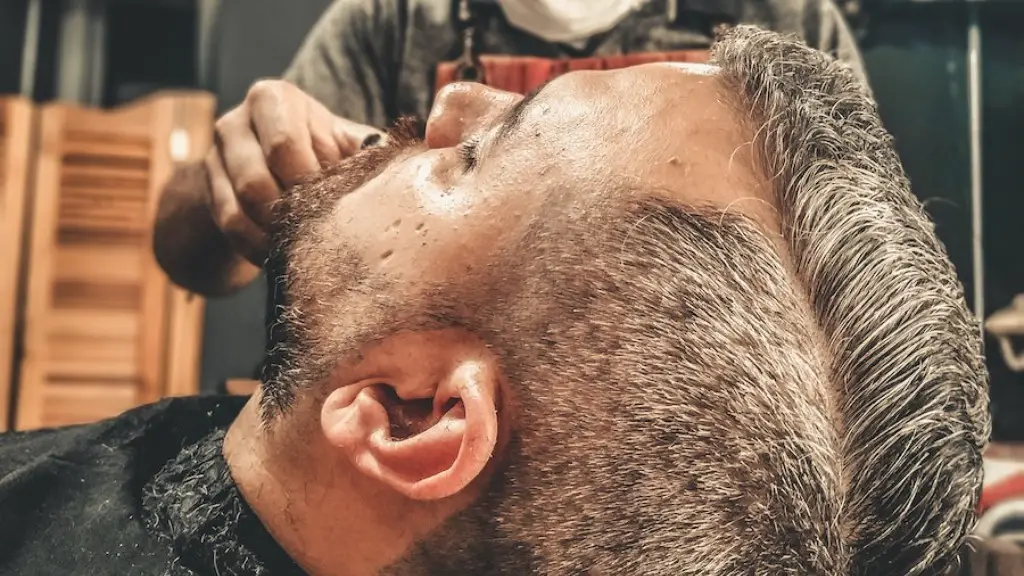I would love to be able to grow a beard like many of the other men in my family, but unfortunately I can’t. I have tried many times, but my facial hair just doesn’t seem to be able to grow in properly. I have even consulted with a dermatologist to see if there was anything I could do to help the situation, but sadly, there is not. So, I remain clean-shaven, much to my disappointment.
There are a few possible reasons why someone might not be able to grow a beard. One reason could be that their body doesn’t produce enough testosterone, which is the hormone necessary for beard growth. Another possibility is that the hair follicles on their face are not responsive to testosterone. Finally, it could also be that they simply have a genetic predisposition against beard growth.
Does no beard mean low testosterone?
The study found that there was no correlation between beard length and testosterone levels or dominance. This means that the hypothesis that beards are honest signals of the beard owners’ testosterone levels and dominance is not supported by the data.
Every young man wishes for a full beard that they see on celebs and stars on themselves while they just hit their twenties However, it is crucial to understand that this wouldn’t be possible because the pubertal process begins only during late adolescence Testosterone is the androgen hormone found in the male body. Testosterone is responsible for the development of male characteristics such as facial hair, deep voice, and muscle growth. The pubertal process is the time in which the body goes through these changes. Most boys hit puberty between the ages of 10 and 16. However, it is possible for some boys to hit puberty as early as 8 or as late as 18. The average age for boys to start growing facial hair is around 13.5 years old. So, if you’re a young man in your twenties, it is unlikely that you will be able to grow a full beard. However, you may be able to grow a mustache or goatee.
Why can’t I grow a beard at 25
There are many factors that contribute to the thickness of facial hair, and unfortunately, genetics is one of them. Some people are simply born with thinner hair follicles, which results in thinner facial hair. However, there are things that can be done to help encourage thicker growth. Many people give up too soon and don’t see results because they don’t give themselves the best chance for success. Try different methods and be patient to see the best results.
Most men will have a full beard by their early 20s, but some may need to wait until they hit 30 to reach full beard growth. Puberty might initiate the facial hair growing process, but how fast and thick your beard grows will depend on factors that we’ll discuss below, including genetics and hormone levels.
What hormones help beard growth?
There are two hormones responsible for beard growth: testosterone and dihydrotestosterone (DHT). While testosterone is responsible for hair follicle priming, DHT promotes the linear growth of facial hair.
There are many reasons why some men are unable to grow facial hair, the most common being genetics. For those men who have trouble growing beards, there are now beard implants available, although they are quite expensive and require surgery.
Will testosterone help with facial hair?
Facial hair growth is largely propelled by testosterone, a hormone. Testosterone levels can vary For men between 19 and 38, the normal range is 264 to 916 nanograms per deciliter (ng/dL).
Testosterone is a hormone that helps promote hair growth. Keeping your testosterone levels within a healthy range can help your beard grow as thick and full as it is naturally supposed to. You can help keep your testosterone levels stable by regularly exercising, eating a healthy diet, getting enough restful sleep, and exfoliating.
What races don’t grow facial hair
There is some evidence to suggest that your ethnicity can affect the growth pattern of your facial hair. A study on The male beard hair and facial skin – challenges for shaving reveal that Chinese, Mexican, and Native American men tend to have less facial hair than Caucasian men. This may be due to differences in hormones or in the structure of the hair follicles.
Facial hair is determined by a combination of factors, including genetic predisposition and hormones. Genetics also affect where facial hair grows and when your beard reaches its full potential. From ages 18 to 30, most beards continue to develop in thickness and coarseness. So if you’re 18 and wondering why you don’t have a full beard yet, it just may not be time. Ethnicity can also play a role.
What to do if beard is not coming?
If you want to grow a healthy beard, it is important to have a balanced diet that includes all the necessary nutrients, vitamins, and omega fatty acids. A diet that is low in these essential components can lead to breakage and other problems with your beard.
We have all heard the myth that shaving your beard will make it grow back better, but scientific studies have shown that this is not the case. Shaving your beard has no impact on its growth, its thickness, or even its hardness. Our knowledge of hair follicles and our skin has greatly evolved, and we now understand that shaving has no effect on the quality of your beard. So go ahead and shave your beard without worry – it will look just as good as it did before!
Why wont my beard grow longer
If you want your beard to grow, you need to avoid breakage and split ends. Over shampooing and over combing can lead to both of these problems. Instead, shampoo and comb your beard gently, and use a good quality beard oil to keep it healthy.
There are some men who are not able to grow beard hair due to their genetic makeup. If you are one of these men, it is important to accept that this is your situation. There is nothing that you can do to change it. You may be able to improve your beard growth somewhat with products or treatments, but you will never be able to achieve full, thick beard growth. Embrace your appearance and be confident in who you are.
Which food increases testosterone?
Fatty fish like salmon and sardines are rich in nutrients that are important for hormonal health, such as vitamin D, zinc, and omega-3 fatty acids. Dark, leafy greens are also a good source of nutrients for hormonal health. Cocoa products, avocados, eggs, berries, cherries, and pomegranates are also good sources of nutrients for hormonal health. Shellfish is also a good source of zinc and omega-3 fatty acids.
If you’re looking to boost your testosterone levels, these tips from Starke can help. Eating a healthy diet and getting plenty of exercise are both important for maintaining good hormone levels. Plus, reducing stress and addressing any underlying medical conditions can also help.
Warp Up
There can be many reasons why someone may not be able to grow a beard. It could be due to genetics, hormones, or even certain medications. Sometimes, men who shave regularly can actually have a harder time growing a beard because they are constantly removing the hair follicles. If you are having trouble growing a beard, it is best to consult with a dermatologist to find out the underlying cause.
There are many reasons why someone may not be able to grow a beard. It could be a hormonal issue, or they may have a genetic disposition that prevents them from growing facial hair. It could also be due to a medical condition or treatment. Whatever the reason, it’s nothing to be embarrassed about – many men are unable to grow beards!





